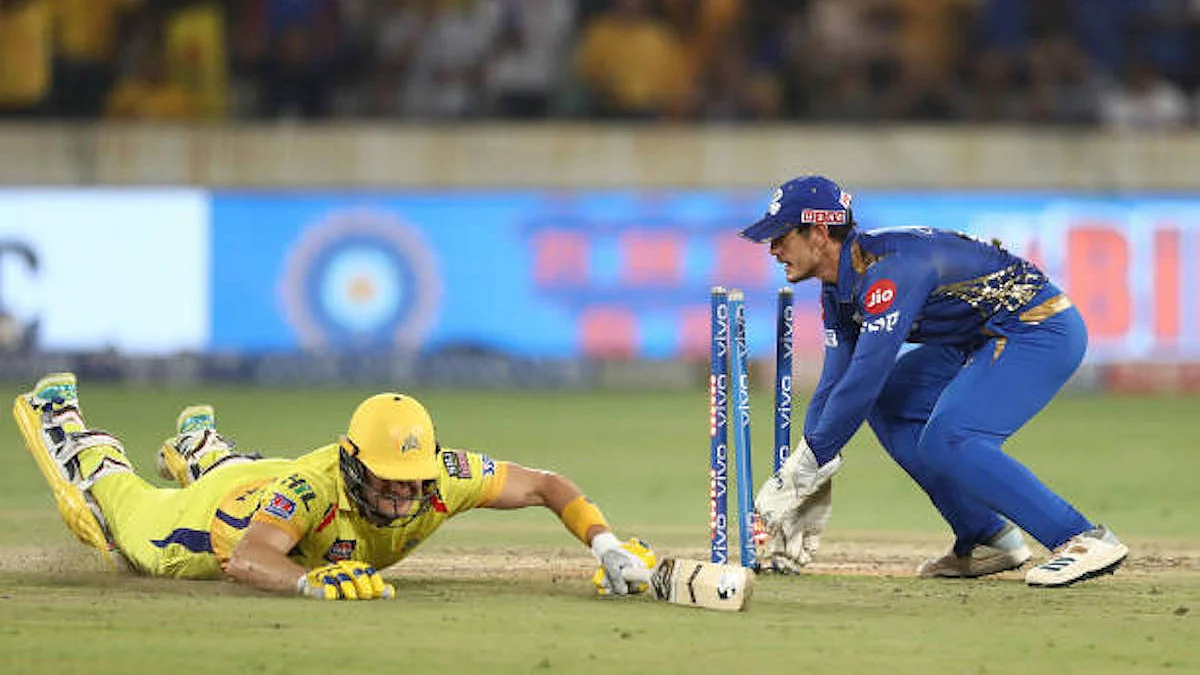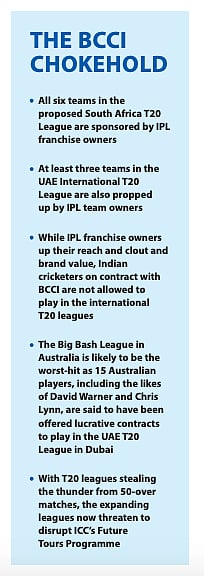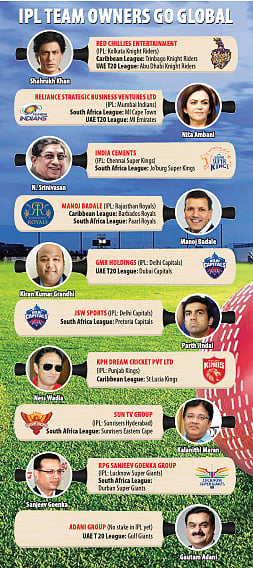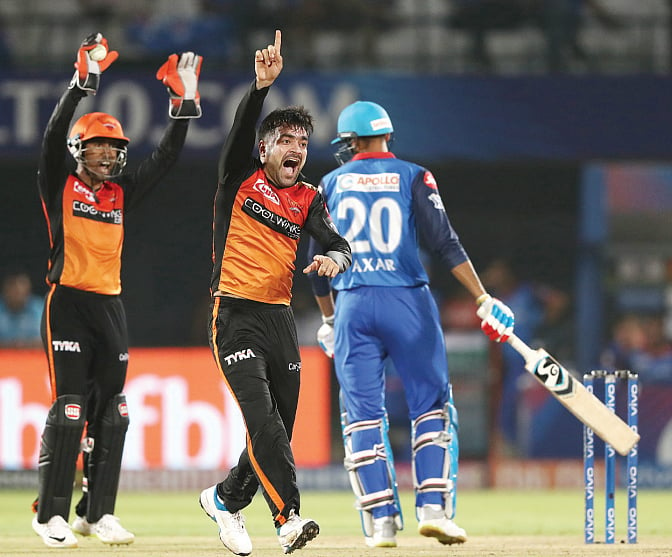Is BCCI being unfair in barring Indian cricketers from foreign leagues?
The BCCI’s decision to restrain Indian players from participating in overseas leagues, even while IPL franchise owners bound all over the same leagues, is revealing

Even avid IPL watchers may have missed the news that the Board of Control for Cricket in India (BCCI) recently vetoed IPL franchise Chennai Super Kings’s plan to appoint Mahendra Singh Dhoni as the mentor of Jo’burg Super Kings, which CSK has acquired, for the proposed T20 franchise league in South Africa beginning early next year.
It was only a mentor’s role, but the BCCI argued that Dhoni was still an active cricketer—he hasn’t yet retired from the IPL—and can, therefore, cannot take any part in any overseas league. Clearly, the world’s richest cricket board will not stomach any ‘brand dilution’ of the Indian Premier League (IPL), the BCCI’s biggest cash cow for more than a decade.
BCCI’s decision to not allow the so-called active players to participate in overseas leagues, even if they are not in the reckoning for the national side (leave alone a central contract), has caused a lot of heartburn among former stars— the likes of Suresh Raina or Irfan Pathan—who have served the country well and were counting on a stint overseas.
Barely a season back, BCCI didn’t allow the charismatic Yuvraj Singh to come out of retirement, play for Punjab, and possibly force himself back into reckoning at the IPL. BCCI argued that Yuvi had been granted an exception to play in Canada T20 League as a retired player and the Board didn’t want to set a ‘precedent’ of retired players changing their mind!
If the BCCI is so determined to not allow Indian players to try their luck in overseas leagues, how does it allow practically all IPL franchise owners to acquire teams in the UAE International League T20 and the South African T20 League early next year?
The acquisitions obviously allow IPL franchise owners to increase the global valuation of their brands and, in turn, help the cash-rich IPL league have an even bigger footprint in the game, but there is nothing in it for the Indian cricketer.


Three of the six franchise teams in the fray in the UAE League belong to IPL owners— Reliance Industries (Mumbai Indians), Red Chillies Entertainment (Kolkata Knight Riders) and GMR Holdings (Delhi Capitals) while the other three teams are also owned by people with deep pockets like Adani Sportsline, Lancer Capital and broadcasters Zee.
Reliance and Red Chillies Entertainment have already named their teams as MI Emirates and Abu Dhabi Knight Riders, respectively, while in early August, the UAE ILT20 released a list of over 50 marquee players who have signed on the dotted line for the league.
The proposed league in South Africa, which has had a chequered past after two failed attempts—the last one being five years ago— pulled off a coup of sorts in July when it was revealed that all of their six owners were IPL franchise owners.
Reliance will own a team based at Newlands in Cape Town while Chennai Super Kings won the rights to the team with headquarters at the Wanderers stadium in Johannesburg. JSW, co-owners of Delhi Capitals, will have a team in Centurion, Lucknow Super Giants in Durban, Sunrisers Hyderabad in Gqeberha (formerly Port Elizabeth) and Rajasthan Royals in Paarl.
The BCCI is yet to comment on the acquisitions, but the buzz is that the Board is not unduly bothered as long as they do not have to part with their players. If anything, they likely reckon the presence of MI Emirates or Abu Dhabi Knight Riders in the UAE or Jo’burg Super Kings in South Africa will only increase the global brand valuation of the Indian Premier League.
Speaking to National Herald from Dubai, one of the UAE promoters said it’s a win-win for the BCCI if IPL brands go global—it will shut the doors on other external players joining the gravy train. “The owners have deep pockets and can wait for four to five years to break even in the new leagues. If a IPL brand has a global presence— SRK-co-owned KKR showed the way by acquiring a team in the Caribbean Premier League (CPL) more than six years ago—it only boosts their global brand value,” said Ajay Sethi, chairman of Channel 2 Group, which hosts radio broadcast rights of all major ICC events for the 2023-27 cycle and is covering the ongoing Asia Cup in the UAE.
An insider to the world of bidding rights, Sethi’s company had successfully bid for the Port Elizabeth team during the 2017 auction for the SA League. “The league was barely a month away from taking off when Super Sport, the South African sports broadcasters, pulled out of its arrangement with Cricket South Africa. The same company has now pledged a bigger purse for the league next year with the IPL brands coming on board,” said Sethi, who had again thrown his hat in the ring this time but again came up short this year.

The UAE IL T20 has already obtained a multi-year approval of the International Cricket Council (ICC), headquartered in Dubai, and the likes of Sethi feel they have what it takes to make it a roaring success in the first edition itself. Cricket’s world governing body, for all its apprehension that the surfeit of franchise leagues may damage international cricket, cannot restrain them as they are technically ‘domestic leagues’ in their respective countries and inject a lot of cash into the game.
Greg Barclay, the pragmatic ICC chairman, had sounded the alarm bells for the future of bilateral international cricket—Test matches in particular—due to the proliferation of T20 leagues. “The single biggest issue [confronting] us now is that we’re creating the cycle for the next eight years (and) just fitting everything that we’ve got into that calendar,” he said in June this year.
If the global footprint of IPL owners jacks up the valuations of their home franchises, it will also swell the coffers of the BCCI. IPL, which is likely to be valued at $8–8.5 million by leading brand valuation company Duff & Phelps in 2022-23 (after the spike in media rights valuation in June) stands head and shoulders above other leagues. IPL has towered over the Big Bash League (BBL), Pakistan Super League (PSL), CPL, the experimental Hundred in England—not to even mention poorer cousins like the Bangladesh Premier League (BPL) and Lanka Premier League (LPL).
The new leagues will pull in the best available non-Indian players. Cricket Australia, by all accounts, are already facing the heat: a recent Sydney Morning Herald report said as many as 15 Australian players— including top gun David Warner— have been offered contracts worth up to Aus$700,000 a year to abandon the Big Bash League and play in the inaugural UAE T20 League.
The Big Bash League will be played between December 13 and February 4 while the inaugural edition of ILT20 is scheduled from January 6 to February 12, making it virtually impossible for Australian players to take part in both the tournaments.
Most of the top Australian players have no obligation to play BBL under their existing central contract, with Warner not having played a single edition since 2014. The BBL’s highest payment till date went to D’arcy Short: US$258,000 (Aus$370,000), which is quite a bit less than marquee Australian players have been offered in the IPL.
Adam Gilchrist, legendary Australian wicketkeeper and a winning IPL skipper himself (in 2009, with Deccan Chargers), did not mince his words on a radio chat: “They can’t force (David) Warner to play in BBL, I understand that, but to let him then go off—or another player, let’s not single out Warner because there will be other players on the radar—it’s all part of this global dominance that IPL franchises are starting to create given they own a number of teams in the Caribbean Premier League.
“IPL monopolising ownership of teams and players, deciding where they can and cannot play is getting a little dangerous,” he said.
The IPL, already going from strength to strength since it started in 2008, took another massive leap into the future in mid-June with the renewal of media rights for the next five-year cycle (2023-27). Soon after this, BCCI secretary Jay Shah triumphantly declared that the IPL was on course to enjoy a 10-week window from 2023 (in place of the existing seven weeks) to ensure the participation of top international cricketers. This would make them the longest running franchise league by a distance. In fact, the renewal of media rights—which brought BCCI quite a financial windfall—was premised on a quantum jump in the number of matches. For now, it looks like the boards of other major cricket nations—Australia, England, South Africa or West Indies, for example— can do little; they have their own leagues, but receive hefty compensation from the BCCI to release their top players.
The writing on the wall is not pretty.
(This article was first published in National Herald on Sunday.)
Follow us on: Facebook, Twitter, Google News, Instagram
Join our official telegram channel (@nationalherald) and stay updated with the latest headlines
